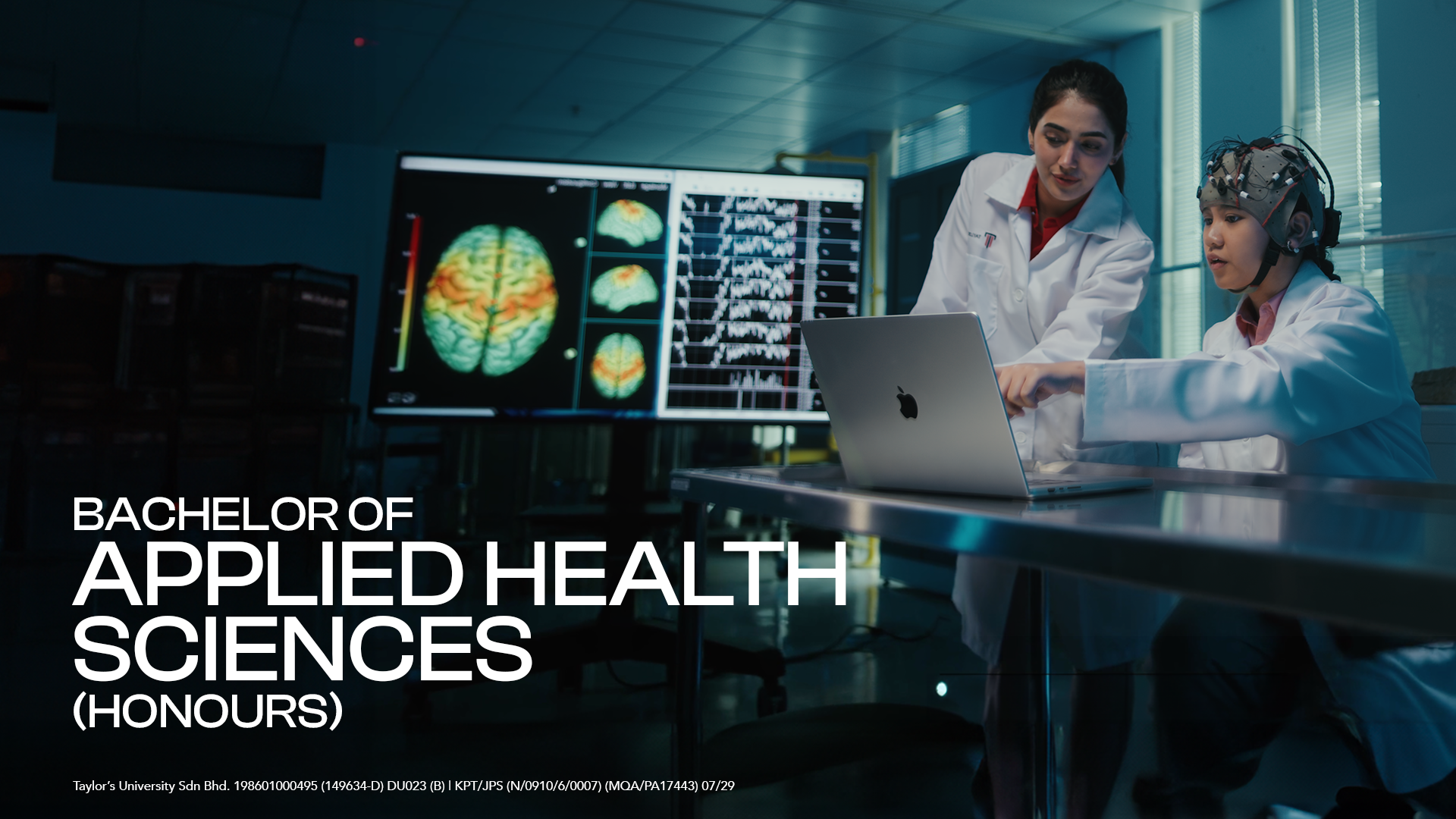Introducing our new Applied Health Sciences degree with specialisations, as the first of its kind in Malaysia to offer specialisations in four unique areas. This innovative programme is designed to equip you with essential knowledge and skills to shape the future of healthcare and positively impact global health. Our curriculum nurtures competent professionals, emphasising practical applications in applied health sciences research, applied health sciences practice, and entrepreneurship.
With our comprehensive curriculum and specialisations, acquire the expertise needed to thrive in various applied health science fields. Neuroscience enhances our understanding of brain health and cognitive function, essential for maintaining mental well-being and lifelong productivity, while Nutrition unlocks the power of food to fuel peak performance and support long-term vitality. Embryology and Genetics provide insights into the origins of health and disease, allowing us to detect concerns early and design personalised treatment plans.
With limited seats per intake, early application is essential for those keen to foster a healthier and more resilient society, capable of leading active, fulfilling lives.
Duration
Study options
Intake Month
Offered by
Specialisations
We offer the overseas transfer options of completing your biosciences programme at one of our established partner universities.
To support your journey, you can also explore the scholarships offered here.
Note: Fees will be reviewed annually. For the avoidance of doubt, Taylor’s reserves the right to revise the fee payable for any given semester.
Effective 1 July 2025, a 6% Service Tax will be imposed on non-Malaysian citizens, applicable to all fees and charges, except International Security Deposit and EMGS application fees. Fees shown in the Fee Schedule are exclusive of the 6% Service Tax. The Service Tax rate and taxable fee components are subject to change as determined by government regulations.
The Applied Health Sciences degree programme is designed to equip you with a comprehensive and nuanced understanding of diverse applied health sciences disciplines to ensure enhanced employability and your readiness for success in this field. Starting with a solid foundation in basic applied health sciences, the programme guides you on a systematic journey toward mastery through specialised modules.
This component consists of Common Core subjects, which are common modules across a discipline that provides fundamental knowledge of the discipline.
Common Core
Note:
This component aims to develop critical thinking, build up social intelligence, and cultivate civic responsibility as well as broaden cultural knowledge. It consists of compulsory and nationally mandated study modules required by the Malaysian Ministry of Higher Education.
Note:
Year 3
Nutrition
Year 1
Note:
The Flexible Education component offers students the flexibility to explore modules in a related or unrelated field, enhancing and complementing their primary major. This component allows students to broaden their knowledge and skills by selecting modules from the same or different schools within the university.
Flexible Education can take various forms, including free electives, extensions, minors, or even a second major. These options provide students with the opportunity to delve deeper into a specific area of interest or broaden their understanding by exploring a different field of study.
Click here to see a full list of all available Flexible Education Components.
You will need to choose one of the packages below.
You will need to select any Minor packages offered by Taylor's University. We have provided some suggested Minors below, and you can refer to the Flexible Education Guide for the complete list.
Note: The minors offered are subject to availability and you will need to meet the minimum module pre and co-requisites.
You will need to select any five (5) of the Free Electives offered by Taylor's University. You can refer to the Flexible Education Guide for the complete list.
Note: The free electives offered are subject to availability and you will need to meet the minimum module pre and co-requisites.
Are you ready to take the next step in your academic journey? Our programme offers an exciting opportunity for individuals passionate about the applied health sciences field. To ensure a smooth admission process, please take note of our entry requirements listed below.
SPM / O-Level with Pre-U / Foundation
Pass SPM//O-level or equivalent with 5 credits (Except for UEC)
SPM / O-Level with Diploma
Pass SPM/O-level or equivalent with 3 credits for entry with Diploma qualification
Note: All information is subject to change. Readers are responsible for verifying information that pertains to them by contacting the university.
Taylor’s Foundation in Science (FIS)
Pass with min. CGPA 2.50 including GPA 2.33 in (ANY 2) subjects: Biology, Physics / Mathematics, Chemistry
Sijil Tinggi Persekolahan Malaysia (STPM)
Min. GPA 2.33 in (ANY 2) subjects: Biology, Physics / Mathematics, Chemistry
Unified Examination Certificate (UEC)
Pass with min. 5Bs including (ANY 2): Biology, Physics / Mathematics, Chemistry
A Level
Min. DD in (ANY 2) subjects: Biology, Physics / Mathematics, Chemistry
AUSMAT (SACEi)
ATAR 60 with min. Grade C+ each in (ANY 2) subjects: Biology, Physics / Mathematics, Chemistry
Canadian Pre-University (CPU)
Min. average of 60% in 6 subjects including min. 65% each in (ANY 2) subjects: Biology, Physics / Mathematics, Chemistry
International Baccalaureate (IB)
Min. 24 points in 6 subjects including min. 5 points at Higher Level (HL) in (ANY 2) subjects: Biology, Physics / Mathematics, Chemistry
Matriculation in Science
Min. GPA 2.33 in (ANY 2) subjects: Biology, Physics / Mathematics, Chemistry
MUFY
Overall 55% including 65% each in (ANY 2) subjects: Biology, Physics/Mathematics, Chemistry
Other Qualifications
Students with other qualifications will be considered on a case-by-case basis.
Notes: All information is subject to change. Readers are responsible for verifying information that pertains to them by contacting the university.
LOCAL STUDENTS
IELTS
Band 5.5
MUET
Band 3
Pre-University / Diploma
Completed Pre-University / Diploma that was conducted in English
Cambridge English / ELS
the minimum score varies by programme
INTERNATIONAL STUDENTS
IELTS
Band 5.5
TOEFL iBT
46
PTE
51
Linguaskill
160
Pre-University / Diploma
Completed Pre-University / Diploma that was conducted in English
Cambridge English / ELS
the minimum score varies by programme
Note:
- International students may join IEN Preparatory Course and achieve the IELTS score.
- All information is subject to change. Readers are responsible for verifying information that pertains to them by contacting the university.


The Future of Health Begins with You
If you’ve ever dreamt of making an impact in healthcare, pioneering research, or changing lives through science, this is your starting point.

The Future of Health Begins with You
When you've successfully completed this Applied Health Sciences degree programme, you could embark on any of these exciting careers, including:
Embarking on your journey towards a Bachelor of Applied Health Sciences degree represents an exhilarating advancement in your educational and professional career. We are here to guide you through the application process, ensuring it is as seamless and straightforward as possible. To discover more about the procedure and the documents required, please visit our Admissions website for further information.
In this section, you get the chance to hear directly from the vibrant voices of our biosciences school's communities. As a gathering space for insights and stories, we are excited to showcase the experiences and knowledge of our lecturers, students, alumni, and industry partners.
Our programme stands out due to its comprehensive approach, offering specialisations in four distinct areas, along with an emphasis on integrated practical training and a holistic understanding of healthcare.
The curriculum is developed in collaboration with industry experts, ensuring it remains current and relevant. Students are exposed to cutting-edge technologies and emerging trends.
The programme is designed to allow students to focus on one specialisation; however, there may be opportunities for interdisciplinary projects or elective courses to explore other areas.
Yes, graduates have the option to pursue advanced degrees such as master's or doctoral programmes in their specific specialisations or related fields.
While both programmes share foundational elements, Applied Health Sciences offers specialisations in Genetics, Neuroscience, Embryology, and Nutrition, providing a more focused and diverse approach to basic healthcare. Biomedical science is a disease-oriented discipline; thus, the Biomedical Science programme is recognised for registration under the Malaysian Allied Health Professions Council (MAHPC).
Applied Health Sciences offers specialisations in Genetics, Neuroscience, Embryology, and Nutrition, allowing students to delve deeper into these specific areas, while Biomedical Science provides a broader overview of various biomedical disciplines.
Yes, there are differences. The Applied Health Sciences curriculum is tailored to each specialisation, providing in-depth knowledge, while Biomedical Science covers a broader spectrum of biomedical disciplines.
Yes, the career prospects differ. Applied Health Sciences graduates may find opportunities in genetic counselling, neuroscience research, embryonic development, and nutrition science, while Biomedical Science graduates may have a broader range of options in disease-orientated disciplines within biomedical research, clinical laboratories, and healthcare management.